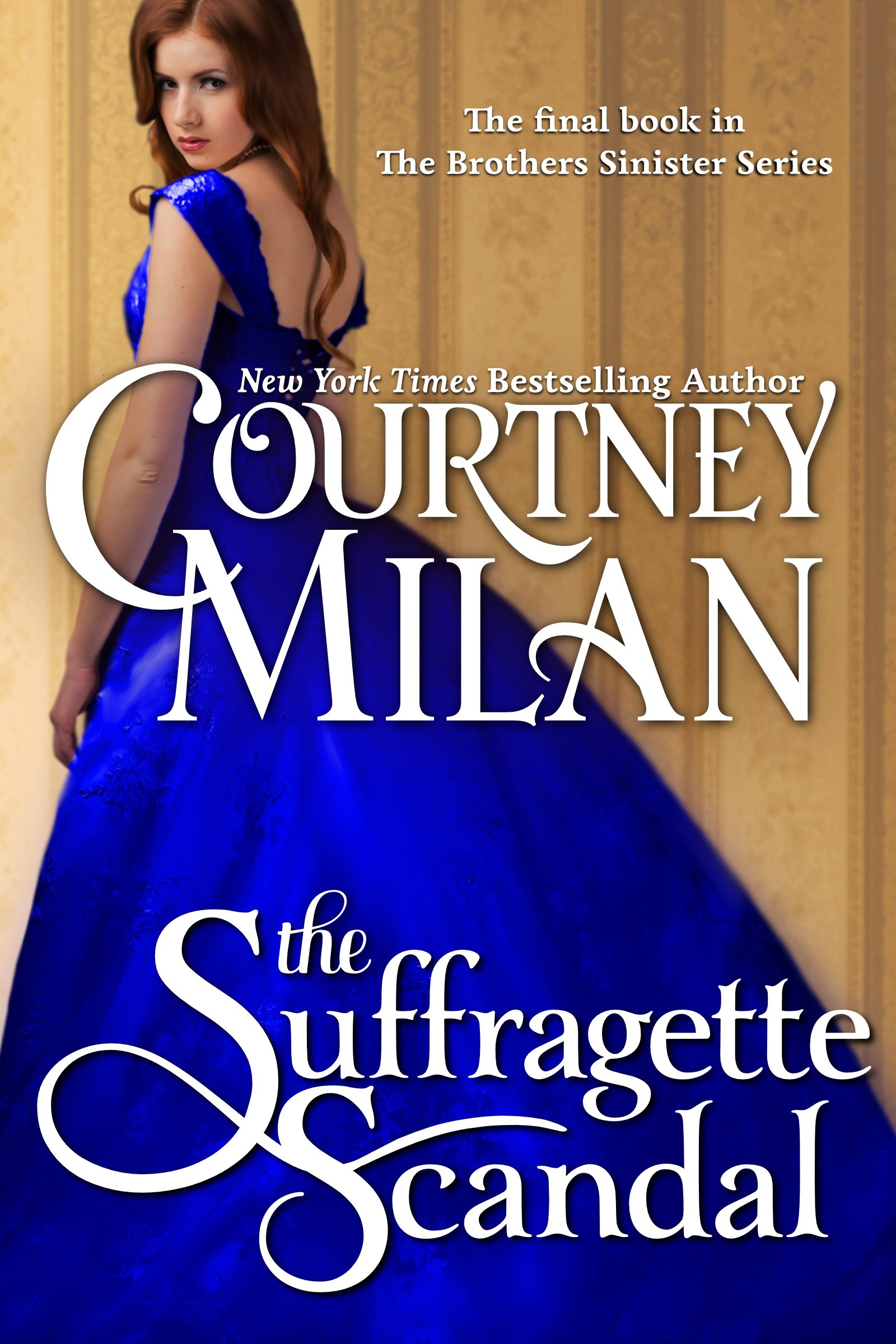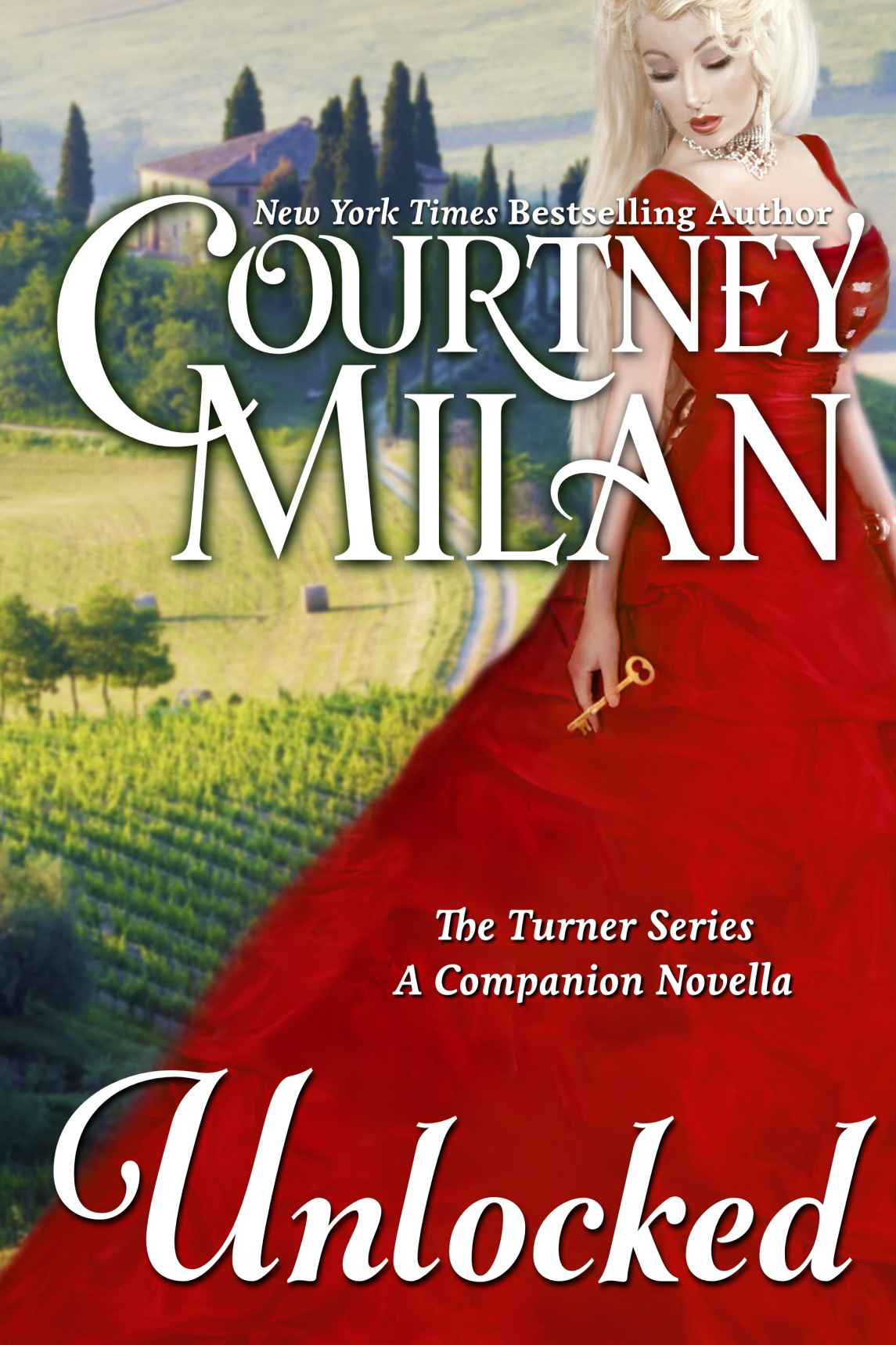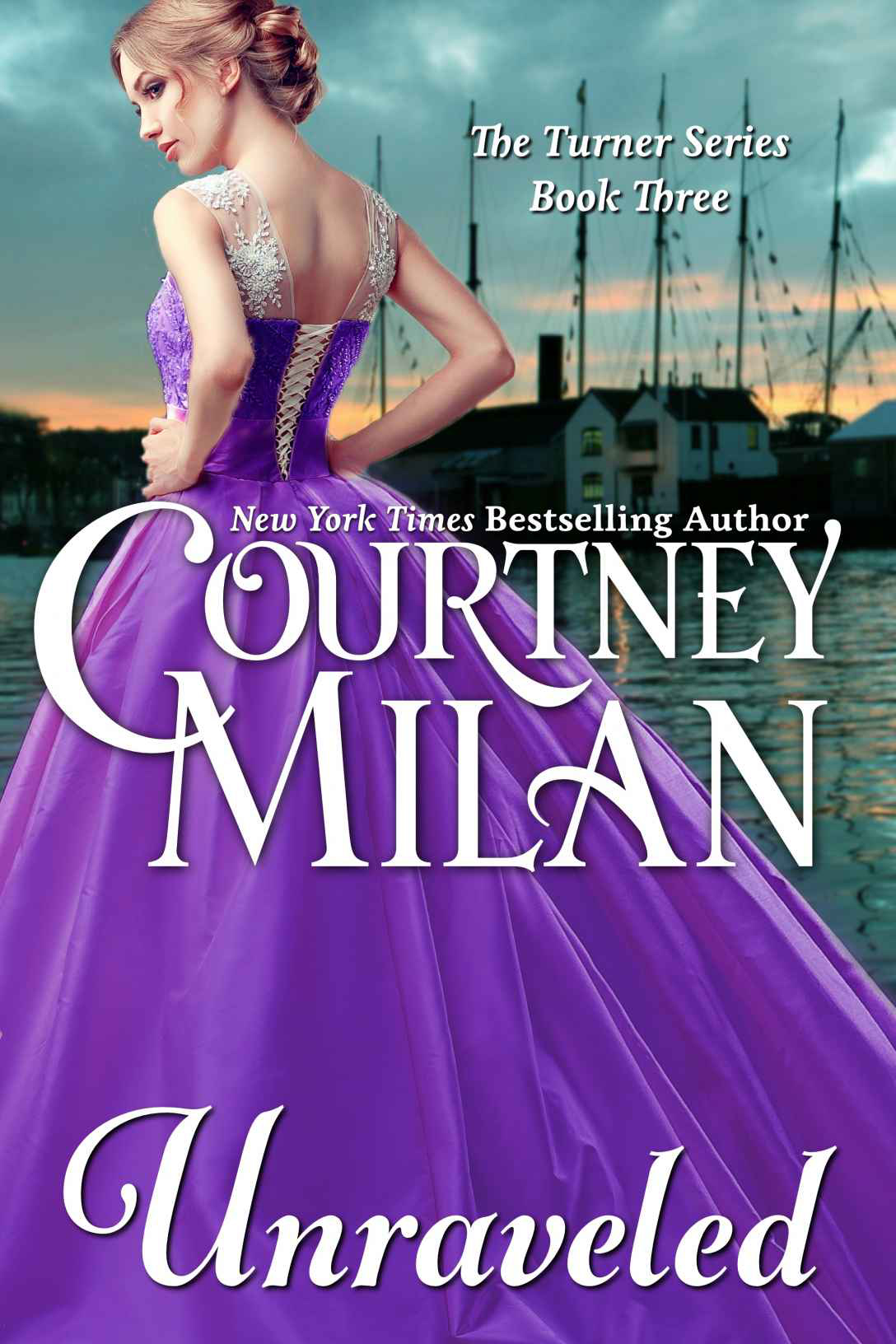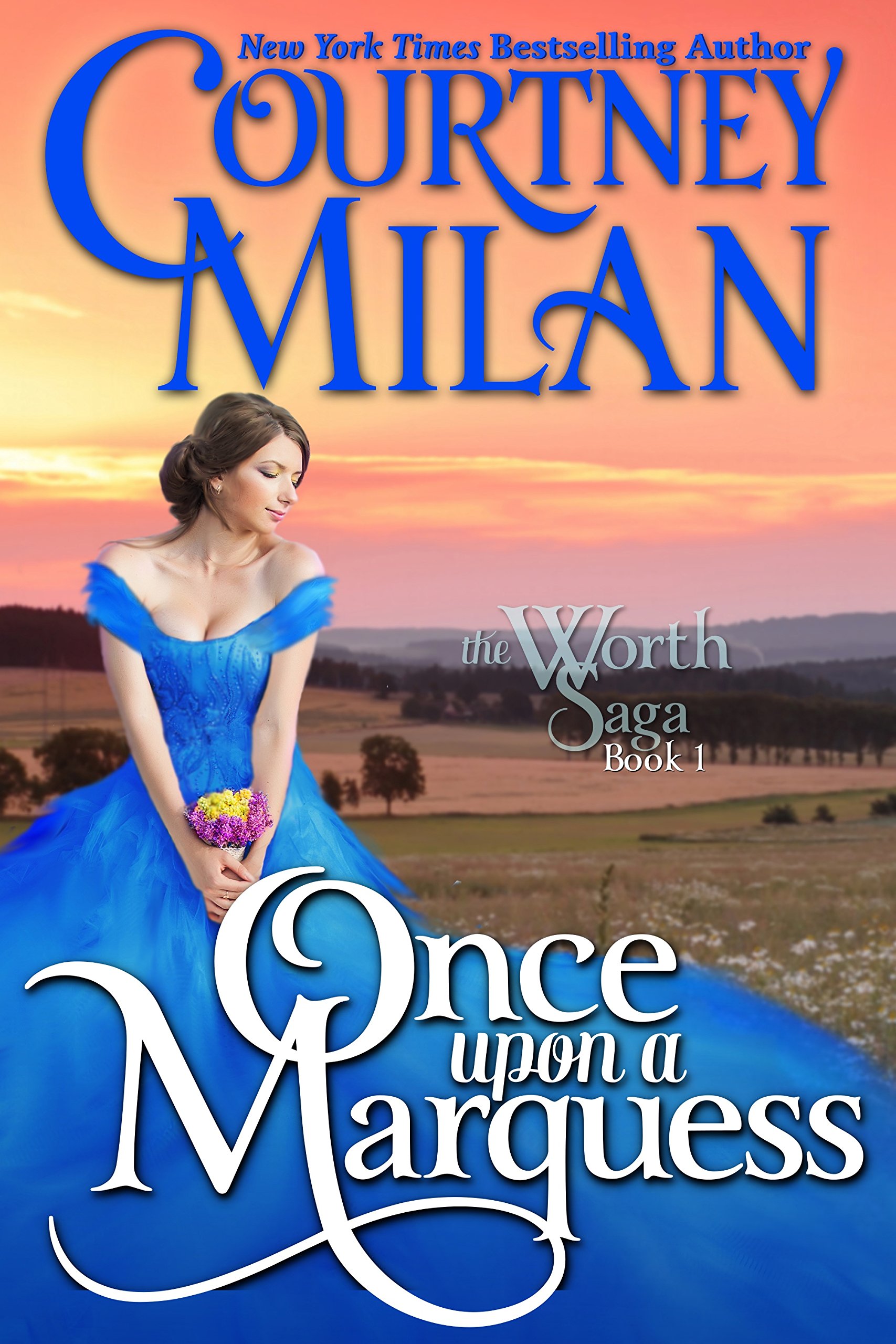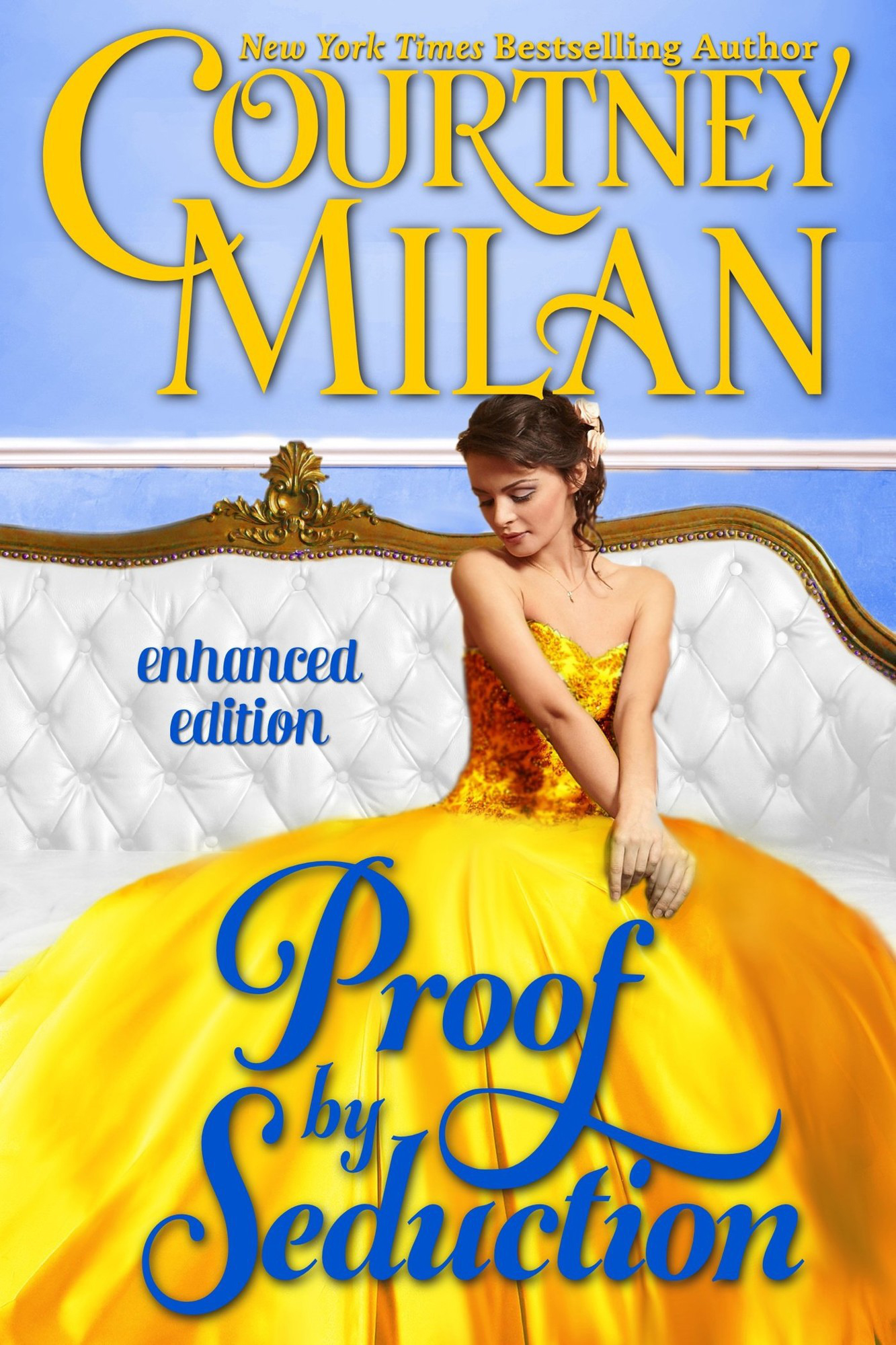Courtney Milan
Books: Romance | Historical | Queer
The Brothers Sinister: The Duchess War (2012), A Kiss for Midwinter (2012), The Heiress Effect (2013), The Countess Conspiracy (2013), The Suffragette Scandal (2014), Talk Sweetly to Me (2014)
The Turner Series: Unveiled (2011), Unlocked (2011) , Unclaimed (2011), Unraveled (2011)
The Worth Saga: Once Upon a Marquess (2015), Her Every Wish (2016), After the Wedding (2018), Mrs. Martin's Incomparable Adventure (2019)
Wedgeford Trials: The Duke Who Didn't (2020)
Proof by Seduction (2010)
Hamilton's Battalion: A Trio of Romances (2017)
The Duchess War (2012)
Set in Leicester, England in 1863.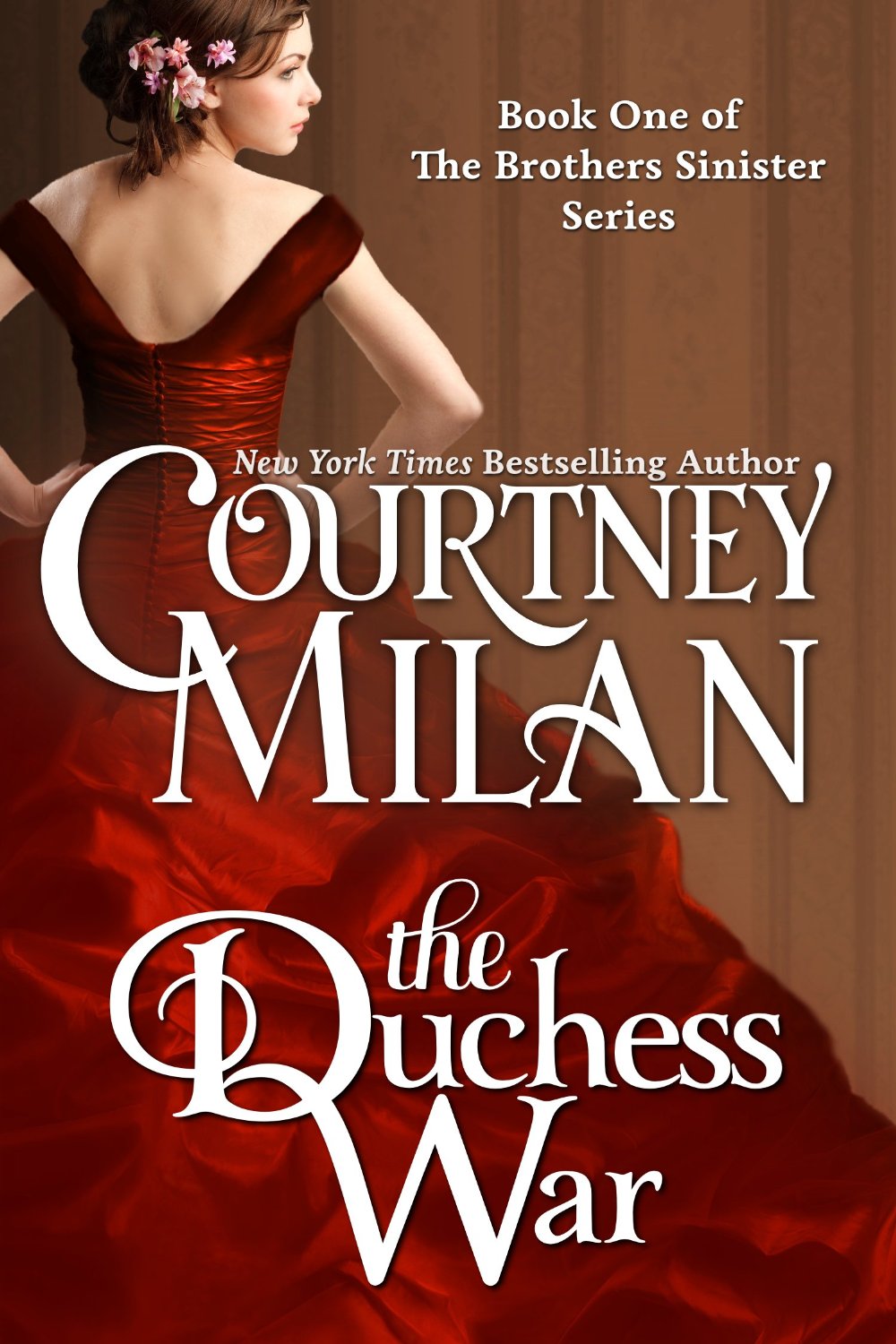
This is the first(ish) book in the series, and the third book I read.
Wilhelmina Pursling has a past she is desperately hiding from. She's changed her name and hidden with obscurity with her two great-aunts, and pushed down everything she once was, to avoid any whisper that might cause someone to look into her past.
Robert Blaisdell, the Duke of Clermont was conceived solely so his father would have an heir. His entire childhood was spent as a pawn in his parent's battles, and it wasn't until he escaped to school and met his bastard half brother that he began to have any inkling of what family truly could be. So he owes his brother almost everything that he currently has become.
"Your Grace," Stevens finally said, "your concern does you justice."
The man's toad-eating did him none.
Robert met Stevens's eyes. "No, it doesn't. It's called basic human decency, and I deserve no credit for doing what every man should."
Of course, having read the following two books, I knew what the end result would be (well, it's a romance, the end is pre-determined, pretty much) but I really enjoying the bits with Sebastian.
"You know me," Sebastian said. "I'm the soul of discretion."
"No, you're not. You are exactly the opposite."
"I knew perfectly well what you meant," Sebastian said. "But I've always found that the quickest way to make someone relent in his foolish edicts is to take every command literally and to perform it with flagrant obedience."
I really really like Sebastian.
Did I like this story as well as the other two? Sadly, no. Minnie was fine, as was Robert, but they're both so serious and so very broken. It just wasn't anywhere near as fun as The Countess Conspiracy.
Characters: Miss Minerva Lane / Minnie Pursling, Robert Alan Graydon Blaisdell Duke of Clermont, Great-Aunt Caroline, Great-Aunt Eliza, Miss Lydia Charingford, Mr. Oliver Marshall, Mr. Charingford, George Stevens, Doctor Grantham, Walter Gardley, Violet Waterfield the Countess of Cambury, Mr. Sebastian Malheur, Dowager Duchess of Clermont, Mr. Marshall, Mrs. Marshall
Published by Courtney Milan
- August 2014 | Rating: 7/10
- February 2016 | Rating: 8.5/10
- August 2017 | Rating: 9/10
- April 2020 | Rating: 8/10
- March 2025 | Rating: 8/10
A Kiss for Midwinter (2012)
Set in Leicester, England in 1864
Jonas Grantham is a doctor–it has been his dream. And once he became a doctor, he vowed never to allow anyone to act against his principles as he did when a doctor he was following all but attempted to murder the pregnant young girl he was seeing.
Miss Lydia Charingford has been ruined. But thanks to her best friend Minnie, no one knows about her ruin except Minnie, her family, and the doctors who saw her.
Unfortunately, one of those doctors was Jonas Grantham who has returned after medical school to take up his practice.
Safe to say that she wouldn't tell her father that Grantham was instructing her on the use of French letters. He might take that amiss.
One of the things I particularly like about Grantham is how blunt he is, but that he's blunt because he cares.
Her skin turned white. That meant the capillaries in her skin were constricting. He could almost have guessed her pulse from the labor of her breath. She'd be feeling cold and light-headed right about now.
"Breathe deeply," he suggested.
Carrying a child was hard on a woman's body, and eight children, delivered ten months after one another, left a woman no room to recover.
Every time he tried to make the argument, though, he found that women disliked being compared to mares and fields, no matter how apt the analogy was.
As for the men—a fallow field, apparently, said nothing about a man's virility. But a wife who bore child after child formed a living, walking boast, one that he could parade in front of his compatriots. Look at me! I'm a man!
"The stuff that babes are made of comes from your own body, Mrs. Hall." He straightened and put away his stethoscope. "If the babe needs the material of bones, it comes from you. If it needs the material of skin, it comes from you. There's a reason you're losing your teeth, Mrs. Hall." She looked away. "You need to take a rest from bearing children. This babe likely won't kill you. The next one might."
This actually comes up in The Countess Conspiracy, although not in as much detail. And it's one of the reason I liked this book so much–it's a blunt reminder of how life really was.
Characters: Miss Lydia Charingford, Doctor Jonas Grantham, Lucas Grantham, Mr. Charingford, Mrs. Charingford, Henry Westing, Peter Westing, Mrs. Hall, Tom Paggett, Doctor Parwine, Corporal Dalling
Published by Courtney Milan
- February 2016 | Rating: 8.5/10
- August 2017 | Rating: 9/10
- April 2020 | Rating: 8.5/10
- November 2023 | Rating: 9/10
- January: 2024 | Rating: 10/10
- March 2025 | Rating: 10/10
The Heiress Effect (2013)
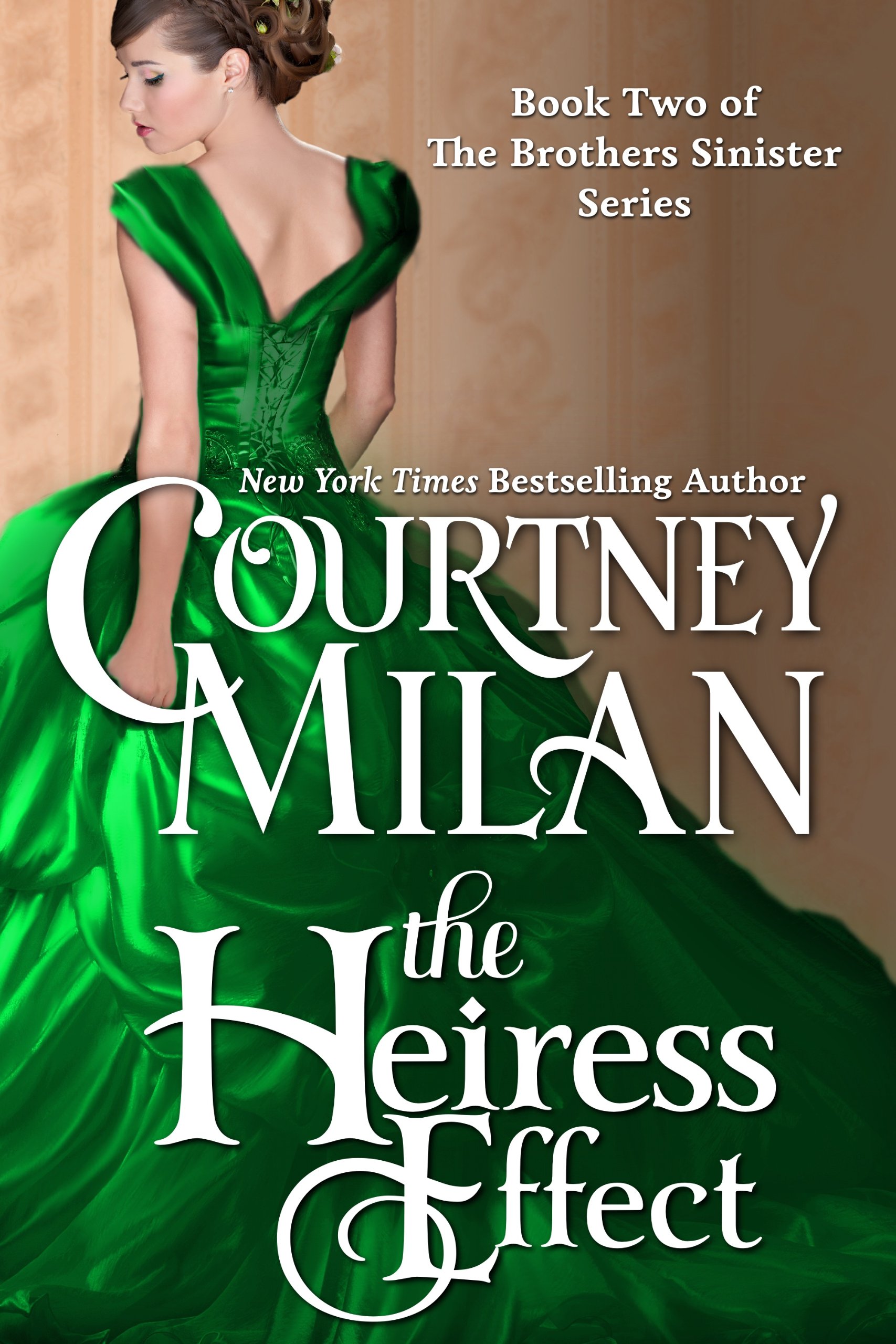 Set
in Cambridgeshire, England in 1867.
Set
in Cambridgeshire, England in 1867.
The is book two of the Brothers Sinister trilogy, and the second book I read, however, I started with book three. So, backwards.
Miss Jane Fairfield is a wealthy heiress who is supposedly seeking a husband, however, she's doing everything she possible can to let any man get close to her–never mind propose marriage. Her only friends are the twins Geraldine and Genevieve Johnson, and they twitter behind their hands and encourage her to terrible choices in clothing, helping to make her more of a spectacle than she already is.
All comparisons failed Oliver. It wasn't the bright pink of anything. It was a furious shade of pink, one that nature had never intended. It was a pink that did violence to the notion of demure pastels. It didn't just shout for attention; it walked up and clubbed one over the head.
It hurt his head, that pink, and yet he couldn't look away.
The room was small enough that he could hear the first words of greeting. "Miss Fairfield," a woman said. "Your gown is… very pink. And pink is… such a lovely color, isn't it?" That last was said with a wistful quality in the speaker's voice, as if she were mourning the memory of true pink.
Oliver Marshall is the bastard brother of the Duke of Clermont. Despite his conception, he was raised by two parents who loved him, which gives him far more than his half brother had growing up. But what Oliver really wants is political power, and the ability to make change.
Emily is Jane's sister, hidden at home, yet longing for life–life denied to her by their Uncle and her guardian. She gets her own part her as well, which I quite loved.
But I really loved Jane. First and foremost for this:
"Oh, God," she repeated, squeezing her eyes shut. "Why do I always do this?"
"What do you always do?"
"I talk. I talk so much. I talk as if my life depended on nothing but words filling the space. I talk and talk and talk and I can't stop. Not even when I tell myself I must." She gave a little sobbing laugh. "I do it all the time—tell myself to shut up—but generally, I'm talking too much to listen to my own advice."
I've described it in myself as "that talking thing." Which is generally the thing where my mouth runs off and my brain follows a pace behind wincing and screaming, "NO! STOP NOW!"
I have also said this to myself:
"Is it something I said?" Jane asked. And if so, which sentence?
There was ANOTHER passage that I have also lived:
"Are you…uh…Mr….uh…"
"Yes," he replied, because he answered to Mr. Uh almost as often as he did to his own name.
Throughout school, the first day of classes my name was always "Michelle… umm…" to which I would reply, "Here!"
As far as the story goes, I liked The Countess Conspiracy better, but that's is mostly because I found it marvelous. I also so the bits and pieces that led up to that book, which were just as delightful.
There is also a marvelous sub-sub plot of Oliver's aunt, who, well, it was just very well done.
One quibble with the cover. Jane is described quite clearly on the first page.
The twelve holes in Jane's corset were an evil, true, but a necessary one; without them, she would never have reduced her waist from its unfashionable thirty-seven-inch span down to the still unfashionable girth of thirty-one inches.
That model on the cover? Not even close.
But aside from that, lovely.
Characters: Mr. Oliver Marshall, Miss Jane Fairfield, Miss Emily Fairfield, Mr. Anjan Bhattacharya, Miss Geraldine Johnson, Miss Genevieve Johnson, Robert Alan Graydon Blaisdell Duke of Clermont, Minerva Duchess of Clermont, Marquess of Bradenton, John Bloom Earl of Hapford, Mr. George Whitting, Mrs. Blickstall, Titus Fairfield, George Lirington, Miss Frederica Free Marshall, Violet Waterfield the Countess of Cambury, Mr. Sebastian Malheur, Mr. Marshall
Published by Courtney Milan
- August 2014 | Rating: 8/10
- February 2016 | Rating: 8.5/10
- August 2017 | Rating: 8.5/10
- April 2020 | Rating: 8/10
- March 2025 | Rating: 8/10
The Countess Conspiracy (2013)
Set in Cambridge, England in 1867.
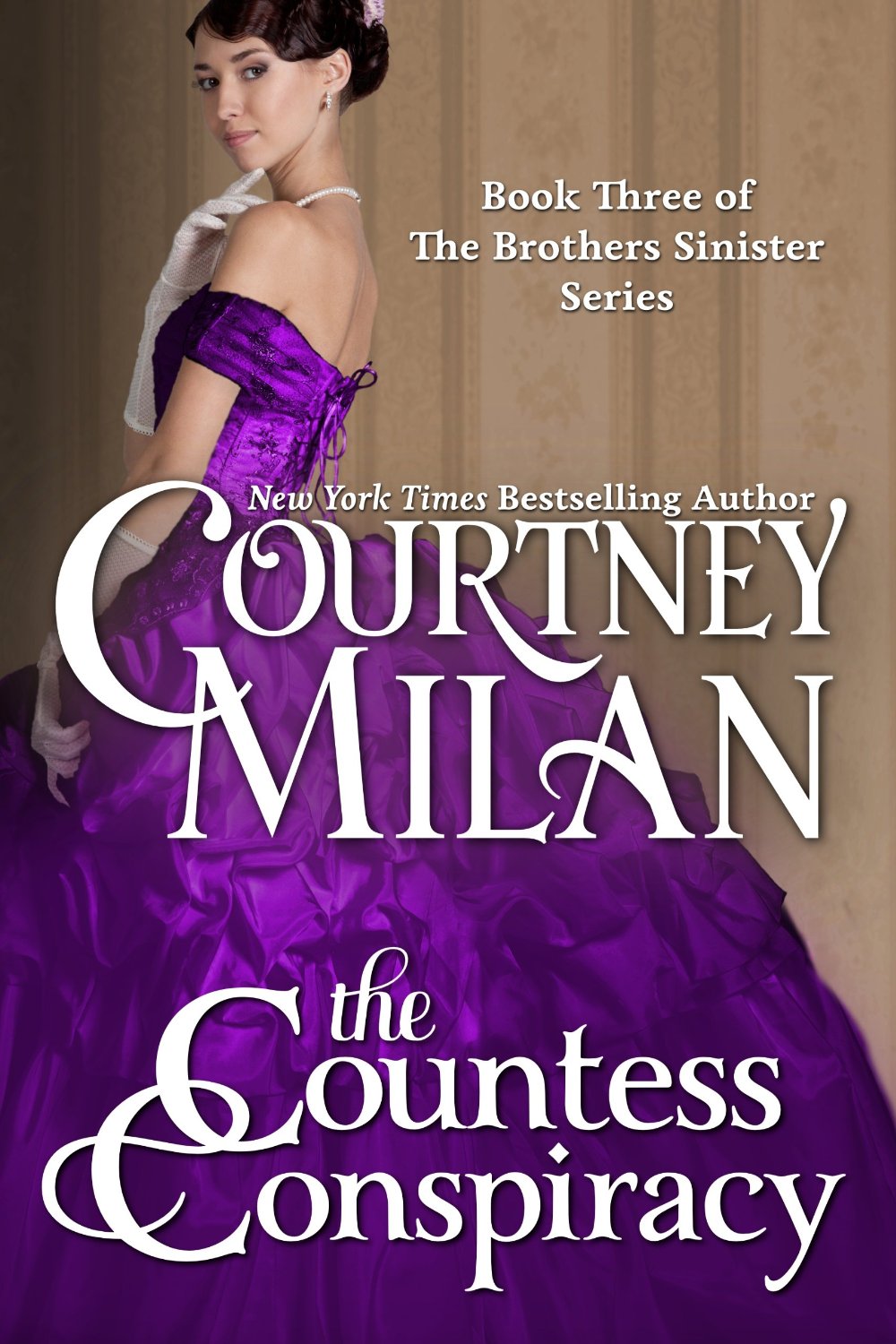 I
absolutely was not expecting to enjoy this anywhere near as much as I
did. I thought it would be a nice diversion, instead, I found myself
sucked in and really wanting things to work out well for both
characters. Despite knowing this was a romance and so there was going
to be a HEA, I was worried the HEA would have Violet make compromises.
I
absolutely was not expecting to enjoy this anywhere near as much as I
did. I thought it would be a nice diversion, instead, I found myself
sucked in and really wanting things to work out well for both
characters. Despite knowing this was a romance and so there was going
to be a HEA, I was worried the HEA would have Violet make compromises.
It totally didn't.
Violet Waterfield is a widowed Countess who is hiding a very big secret. All the scandalous scientific theories and papers put forth by her childhood friend (and notorious rake) Sebastian Malheur are, in fact, her theories.
No one will respect the ideas of a woman, and so Sebastian has been pretending for years to be the authors of Violet's papers. But dealing with the derision and scandal (for he is essentially talking about intercourse in public, even if it is plants and animals, is considered by many to be indecent.
"He's flaunting his godless ways. He is the most dissolute reprobate. Talking in public about breeding and intercourse."
But if he gives up the charade, what will become of Violet's research?
Violet is a very intelligent, very witty, but also damaged character. Her past is full of tragedy and repression and suppression and secrets, and she believes herself to be without value and fundamentally unlovable. She's sharp and caustic and refuses to let herself feel anything for anyone.
Despite that, Sebastian loves her.
Now, sometimes when you read things like that, you have to wonder yourself what the other character sees in them. In this case, Sebastian and Violet were childhood friends, so she allowed herself to trust him perhaps more than anyone else in her life, and he knew her far better than anyone else, and knew that she was more than her fragile and sharp exterior.
All of which is great, but what I liked best about the book was the science and the humor.
There was nothing shameful about the figure Sebastian was pointing to, not unless one harbored an irrational hatred for bar charts.
Ah, Violet wouldn't say that if she'd ever been forced to sit through a PowerPoint presentation.
But Violet and Sebastian together are utterly marvelous.
So, shipping—"
If there was a more baffling change of subject, Violet didn't know it. "Shipping?"
"Yes. You know. Ships. Floating things that displace water and carry cargo?
They're really quite marvelous.
But more importantly, there is the science. The story doesn't go into the science itself in depth, but rather the place women had in science at that time.
Which was, as far as the general public was concerned, none.
Which makes the dedication of the story so wonderful.
For Rosalind Franklin, whose name we know. For Anna Clausen, whom I discovered while writing this book. For every woman whose name has disappeared without recognition.
It's a wonderful story, that I highly recommend, despite the boinking.
Characters:Violet Waterfield the Countess of Cambury, Mr. Sebastian Malheur, Benedict Malheur, Lily Ellisford, Amanda Louise Ellisford, Dowager Baroness Rotherham, Simon Bollingall, Alice Bollingall, Robert Blaisdell the Duke of Clermont, Minerva Duchess of Clermont, Mr. Oliver Marshall, Jane Marshall
Published by Courtney Milan
- August 2014 | Rating: 9/10
- February 2016 | Rating: 10/10
- August 2017 | Rating: 10/10
- April 2020 | Rating: 9/10
- March 2025 | Rating: 9/10
The Suffragette Scandal (2014)
Set in England in 1877.
Edward Clark has allowed his family to think him dead–only fitting since his younger brother all but had him killed. Unfortunately, that same younger brother is now going after one of the men Clark considers to be his true family, so Clark has returned to England, hoping to stop his brother's plans.
It had been years since he'd imposed on Patrick. His friend had never breathed a word of the debt that Edward had incurred. He wouldn't—Patrick wasn't the sort to parcel out who owed what to whom. That's why Edward had to keep score on his behalf. Those debts would never balance. All Edward could hope was to keep them at bay.
Frederica "Free" Marshall is doing all the things she set out to do: she runs a paper by women and for women, is pushing for female sufferage, and is living her life on her own terms (as much as a woman can in 1877). Unfortunately, she has made enemies, one of whom is Edward Clark's brother.
But unlike Clark, Free does have family she can count on.
She leaned up and kissed his cheek. "You're my favorite brother."
"I'm your only brother," he said in dark amusement.
"You see?" Free spread her arms. "I can't count on any of the others to even exist when I need them."
Whether she can learn to count on Clark is something else entirely.
I really liked Clark. He didn't even trust himself, but those he held dear trusted him, which allowed you to know that he wasn't truly the scoundrel he made himself out to be.
"Are you really left-handed?" Mr. Marshall asked.
"No. I've just been pretending to use my left hand my entire life because I enjoy never being able to work scissors properly."
What I liked best about Free is that this is not your typicaly historical romance where the heroine has to be rescued by the hero. Free rescues herself, and her fight is not against the hero, but against society.
Please note, however, that the model on the cover does not accurately represent Free. She doesn't dress in ball gowns.
She wore a dark skirt and a white shirtwaist. But her jacket had a decidedly mannish flair to it—strong lines, military braid at the cuffs, and epaulettes at the shoulders. She wore a man's bowler hat.
This is a very different story from the other books in the series, but just as good–possibly because it reflects the changes in society that were happening at the time.
But here is why I really like this story. These are excerpts from the Author's Note.
When I chose to make Free an investigative reporter, I modeled her after a real nineteenth century investigative reporter, Nellie Bly.
That brings me to another nineteenth century woman—Josephine Butler. Butler was a devout Christian who abhorred sexual immorality. You might think that a woman like Butler would keep silent about something like the Contagious Diseases Act. But she was outraged by the double standard in the Acts—a standard that allowed the men who spread the disease to walk free while imprisoning only the women.
Yet another reminder of how women were actually treated in the past.
Published by Courtney Milan
- February 2016 | Rating: 9/10
- August 2017 | Rating: 7.5/10
Talk Sweetly to Me (2014)
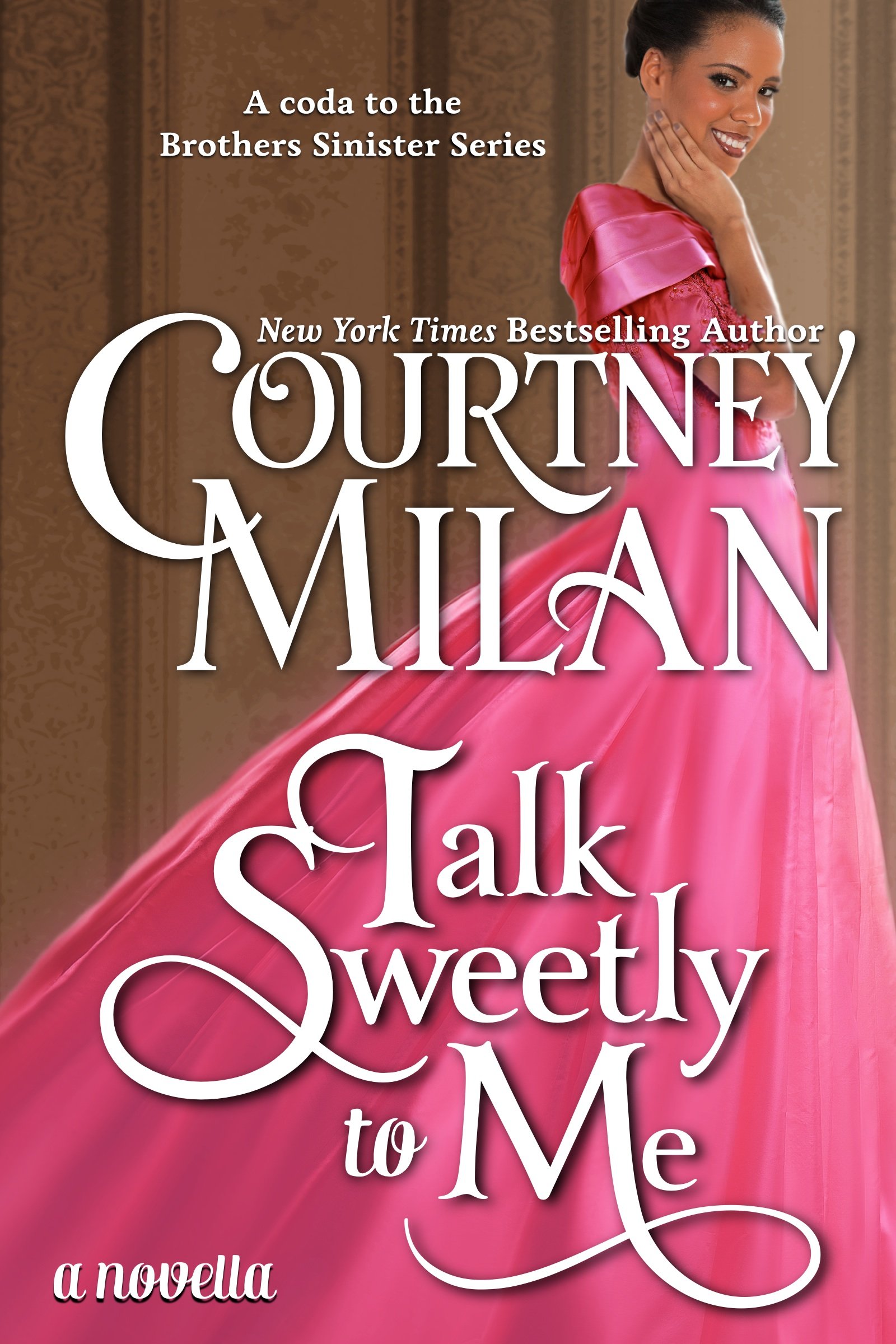 Set
in Greenwich, November 1882
Set
in Greenwich, November 1882
Miss Rose Sweetly is a shop-keepers daughter and a mathematical genius who is currently working as a computer at the Royal Observatory. She is also keeping her pregnant sister company while her husband is away on a tour of duty.
(H)e picked up one of the offending fruits and smiled in her direction. "Why is it that the oranges bounced, but the apples did not?"
His smile felt like an arrow, one that struck her straight in the solar plexus. And so Rose adjusted her spectacles on her nose and said the first thing that came to mind.
Unfortunately, the first thing that came to mind was…
"It's Newton's Third Law. Upon collision, the apple exerts a force on the pavement, and so the pavement must exert an equal and opposite force on the apple. The structure of the apple is inelastic and so the apple bruises. The orange, by contrast…" She swallowed, realized that she was babbling, and shut her mouth. "I'm sorry, Mr. Shaughnessy. I don't think that's what you meant to ask, was it?"
Stephen Shaughnessy is an author and a rake (and also the author of the "Ask a Man" column of the woman's paper. But just because he's a rake, doesn't make him a complete jerk.
(H)e had a very firm rule that he did not do terrible things to people in general, and to women in particular.
I was very glad when my father came to London to start his own emporium. I wasn't on display any longer, not until my father tried to have me learn deportment." Rose smiled. "It didn't work so well—I didn't like the idea of performing in society. Eventually, on Patricia's advice, he bribed me to pay attention by offering me tutoring in higher mathematics."
As you can tell by the cover, Rose is of African descent, and if this book hadn't been by an author who has proven she has done her research on other historical topics, I would have skipped it. I can't give you an opinion as to how a reader of color would take Rose, but it seemed to me that she did a very good job portraying how life would have been for Rose and those like her.
For those who are curious, she did this through Patricia's pregnancy, and how Patricia was treated by the doctor. But these scenes weren't just to show racism of the time, Patricia was integral to the story
I particularly loved Rose's dream.
THAT NIGHT, ROSE DREAMED that a column of numbers was chasing her through some odd, non-Cartesian landscape, a vista of lines and swirling colors. In the distance, someone was laughing—not a cruel laugh, or even a laugh at her expense. Just a friendly, welcoming laugh.
The numbers caught her, taking hold of her shoulder. She jerked away, but they held her fast.
How did numbers grip? She turned to them, fascinated…and very groggily came awake.
That is an actual dream, not the stuff that authors and movies often pretend are dreams.
One thing I keep forgetting to mention–you should make a point to read her author's notes (I've quoted from them before) because they tell you where some of the historical bits come from.
The other source of inspiration for this was a real woman. Her name is Shakuntala Devi, and she was known as the human computer for her ability to calculate complex cube roots in her head in a matter of seconds. Her roots were modest—her father was a circus performer—but not only was she a mathematical genius, she also wrote cookbooks, nonfiction on homosexuality, nonfiction on learning mathematics, and novels (many of these are available as ebooks today). She even ran for office.
One thing I do not like about this book is that Rose succumbed to Stephen prior to marriage. I realize that Courtney Milan writes boinking books, and so boinking is expected, but those portions of the story felt false to me–I didn't really believe that Rose would have made such a decision, no matter how good of a rake Stephen was. (Though I do appreciate that it WAS Rose's decision entirely.)
Published by Courtney Milan
- March 2016 | Rating: 7/10
- August 2017 | Rating: 9.5/10
Unveiled (2011)
I started this and put it back down several times, because I was unsure about the premise. But I eventually got through the first chapter, and fell right into the story.
Margaret Dalrymple lost everything to Ash Turner–her home, her title, her legitimacy. So when she secretly remains to care for her father when Ash comes to the estate, she is looking for ways to defeat him and allow her and her brothers to take back their legitimacy.
Ash Turner is a self-made man, who discovered that the current Duke of Parford was a bigamist, and has become heir to the Dukedom–all for revenge against the Duke.
I truly could not see how this relationship was going to work out, which is what initially put me off, but then I discovered that Ash was actually a good man, and that Margaret would have reason to both fall in love with him and understand Ash's grudge against her father.
If you gave people compliments, they tended to like you. If you confided in them, they were likely to trust you. And if you then asked for their help, they were yours forever. Of course, it helped that Ash genuinely liked almost everyone. People could sense that; it was as good as a master key on a housekeeper's ring, opening up the affections of even the most recalcitrant of individuals.
The other thing I especially liked was that Ash can't read. He's dyslexic, and I was fascinated by how this worked in the story.
He must have realized how ridiculous he appeared, because he shook his head.
"No, madam," he said. "There's no problem here. We were having ourselves a friendly fight, we were—me and this book."
I also liked Mark (the subject of the second book) who is writing a "Practical Guide to Male Chastity".
"I was thinking I ought to drag my brother with me to some of the society events this upcoming Season, so he can find a woman virtuous enough to satisfy his practical needs."
"In point of fact," Mark said dryly, "a wedding would be of little practical use, if she remained virtuous after marriage."
But don't think that Ash is completely virtuous. He will fight for what is his. Literally.
If you do, I won't just steal your title and your lands. I will run any bank that holds your funds into the ground. I will bribe your servants to slip nettles into your bed. I will hire trumpets to stand outside your home every evening, where they will sound notes at irregular intervals.
OK, that last line just makes me giggle, because it is so horrible to contemplate.
SPOILER
Ash has dyslexia. Everything he has done, he has done while barely being able to read. This struggle is heartbreaking–especially when it intrudes in Ash's relationship with Mark.
Mark was different from agriculture. His book would naturally prove different. And Ash had made a promise. If he wanted it, he told himself, he would simply make it happen. There was no other choice.
Thus far, the force of his will had only managed to give him a raging headache. It shifted behind his eyes, the letters sliding off the page before he could pin them down, until all he wanted was to sleep—and he'd only managed to comprehend the first three syllables.
And this is what makes Ash such an incredible hero.
END SPOILER
The other thing I particularly liked was the explanation for why the Duke was such a horrible jerk. He isn't a shallow evil character, but the product both of his past, and:
But he's particularly a jerk—and almost childishly so in Unveiled—because of his medical history. Throughout the book, he's having an ongoing series of transient ischemic attacks (sometimes called mini-strokes).
I really like that she put so much thought into how and why he would behave as he did.
Published by Entangled
- March 2016 | Rating: 8/10
- August 2017 | Rating: 9/10
Unlocked (2011)
Evan Carlton, Earl of Westfeld behaved so badly during Lady Elaine Warren first season that he left the country and spent 10 years on the continent mountain climbing.
Lady Elaine Warren was so badly bullied her first season that even ten years later she has not had any offers, and hates going to social events where her bullies, especially Diana, Lady Cosgrove will be. But she has refused to allow them to break her, and laughs loudly, despite the mocking she knows she'll receive.
There are two things I had serious difficulty with in this story: 1) the mountain climbing 2) the bullying.
Because of that, I cannot fairly review this book, because I absolutely never want to read it again.
I did, however, adore Lady Elaine's mother.
"And you danced three times."
"Yes," Elaine said uncomfortably. "I did." She sighed. "At least that's three times better than the last ball."
Her mother set the brush down with a click. "No, it is infinity times better, the ratio of naught to three being boundless. If you continue to attract dance partners at an infinite rate, at the next ball you attend, every man in all of England will ask you to dance."
Elaine smiled. "You're being ridiculous, Mama."
Her mother frowned. "Yes," she finally admitted. "It is rather optimistic to extrapolate a geometrical trend from two data points."
Published by Courtney Milan
March 2016 | NR
Unclaimed (2011)
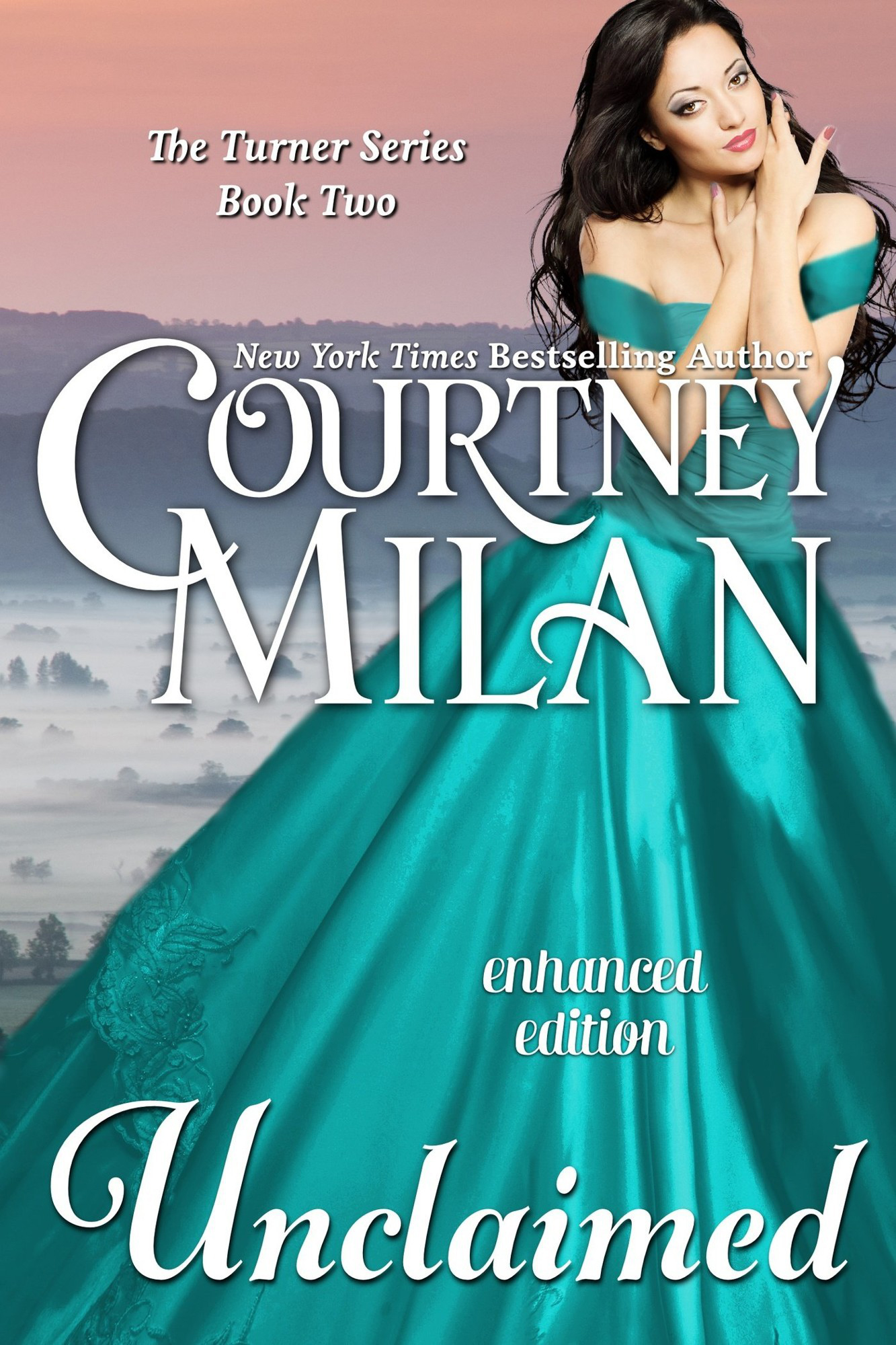 Set
in London and Shepton Mallet, in 1841
Set
in London and Shepton Mallet, in 1841
Sir Mark Turner was knighted for his popular work on morality, however, neither he nor anyone else expected this popularity and what would come along with it–adoring crowds, jealous individuals, and random people trying to make money off his popularity.
Why was it that men had to take every good principle and turn it into some sort of a club? Why could nobody do the right thing on his own? And how had Mark gotten himself embroiled as the putative head of this one?
"I'm not a member of the Male Chastity Brigade," Mark said, trying not to make his words sound like a rebuke. "I just wrote the book."
For a moment, Tolliver simply stared at him in disbelief. Then he smiled. "Oh, that's all right," he said. "After all, Jesus wasn't Church of England, either."
I quite like Mark.
Really, Mrs. Farleigh. You must think that because I have never been in anyone else's skin, I cannot be comfortable inside my own."
I really really liked Mark.
"But, Sir Mark! She's wearing scarlet. She made you give up your coat. You can't really believe she's an innocent. She…she could be a fallen woman!"
"There is no such thing as a fallen woman—you just need to look for the man who pushed her." … "When someone falls," Mark said, "you don't throw her back down in the dirt. You offer her a hand up. It's the Christian thing to do."
Jessica Farleigh is a courtesan looking to retire from the life, and so she takes the challenge (and hopes for the reward) of knocking Mark Turner off his pedestal.
She wasn't impossibly thin and delicate; nor was she extraordinarily buxom. Still, she somehow made every woman around her seem wrong and ill-proportioned by comparison. For just one second, Mark felt a wistful tug. Why doesn't anyone ever try and foist women like her off on me instead?
Mark Turner has bought back his family's childhood home, and looks to escape the crowds of London there.
From here, he could not make out individual words—just the rough lilt of Somerset farm country, a rise and fall that, from a distance, sounded like…home.
He hadn't been back in more than twenty years. Long enough to lose the accent himself, long enough that his tongue felt too fast, too sharp in his mouth, an unwelcome, foreign invader in this familiar place.
I very much liked the idea of a courtesan heroine, especially paired with Mark's ideals on chastity.
We also learn about the Turners' mother–as her insanity played such a large part in how her sons developed. The things she did were horrifying, but they were also not unlikely–especially in a time where parents were generally allowed to do as they pleased with their children.
Again, the one thing I didn't like is the boinking prior to marriage–not on a religious grounds, but because it just didn't feel right for that character.
I can easily believe that Mark would accept Jessica as she was–that was very much in his character. I just have a hard time believing that he'd not wait until marriage.
Published by Entangled
- March 2016 | Rating: 8/10
- August 2017 | Rating: 8/10
Unraveled (2011)
Smite Turner is a very difficult person. First off, he was named Smite by his mother (or rather, a long biblical verse for which Smite was how it was shortened).
He is the most damaged of the brothers, Ash having escaped to go make his fortune, and Mark having been protected by his older brothers.
And Smite is very damaged.
But he is not a bad person, just one that cannot relate normally to others.
Smite knew he was being rude, retreating from the conversation as he was. But he had little truck with easy conversation. Nothing about him was easy; why should he pretend otherwise?
"Don't think anything of that," Miranda said, coming to stand by Smite. "For him, that was an apology on bended knee. Anything more than he just managed, and he'll overload his sentimentality quota."
Smite felt a touch of annoyance, and he yanked his hand away.
But (the man) gasped. "Never tell me he still has the sentimentality quota."
Miranda's look of surprise mirrored his. "Never tell me that the sentimentality quota truly exists." The two of them exchanged shocked glances, and Smite found himself folding his arms across his chest.
Miranda Darling has been surviving in Bristol mostly by her wits. The daughter of actors, she was orphaned and had to make her way on her own–all the while carrying for a young boy who somehow ended up in her care.
The authors of heartwarming books apparently had no contact with actual adolescent boys. They weren't kind. They didn't know how to adore. They were just surly.
She hasn't done anything truly illegal, but she is involved in a shadowy organization run by The Patron.
I very much liked the premise of this story. First, that Miranada was so willing to become a mistress to secure her future felt true to both her character and the times. (So I'm not ALWAYS against boinking prior to marriage in books.)
I also like how Smite was not miraculously healed of all of his issues by love. Yes, he does change, but he remains a difficult man who has many problems he will probably never get over.
Miranda leaned over to the other woman. "Despite his apparent fluency in the English language," she said earnestly, "Smite lacks the capacity to express some very basic thoughts. Compliments that other people manage quite easily, like ‘My, you look lovely,' or ‘I hope you don't die tonight' are quite difficult."
I liked this story, and I liked Smite–damaged as he was.
Published by Courtney Milan
- March 2016 | Rating: 8.5/10
- August 2017 | Rating: 8/10
Once Upon a Marquess (2015)
Judith Worth has been holding her siblings together as best she can, after there family was ruined by Christian Trent, the Marquess of Ashford. Except that Christian didn't set out to ruin anyone, he just needed to do what was right.
One thing I particularly like about Courtney Milan's characters is that they are often atypical. Christian would today have a tidy mental diagnosis, but in the 19th century, such behaviors were usually hidden by families, seen as scandals.
Demolition, then division: He'd separated the bits first by size, and when that seemed unsatisfying on some gut level, by deviation from roundness.
Then, he'd very carefully started eating— from the most irregularly shaped crumb toward the most symmetrical.
He was almost finished with the infuriatingly oblong bits when Judith came in.
The same goes for Judith's sister Theresa (and we slowly learn the many sacrifices that Judith has because of and for Theresa).
There is so very much I like about her writing, especially the life lessons that are seemingly dropped at random.
People get upset for good reasons. Trying to cheer them up denies what is happening to them."
"No, it doesn't." Christian set a hand on the seat between them. "It's a way of recognizing their very legitimate feelings of distress and wishing that person well. You cannot reasonably think that it's cruel to hope that an unhappy person will feel better."
And so many parts are just plain funny.
You know how gossip is. Go to a few parties. Dance with a few young ladies." She shrugged. "Marry one of them, and nobody will ever speak ill of you again."
Christian couldn't help himself. He burst into laughter. Well, at least he'd tried to be serious. "Go to a few parties. Dance a few dances. Commit yourself in a public, binding ceremony to another person for the rest of your life. One of these things is rather different in scope than the others, don't you think?"
"We represent the British Empire," Christian said, watching her. "Embroiling ourselves in conflicts where we do not belong is our imperial business."
Interestingly, although this being a romance, I knew the main characters were going to work things out, but I had a very difficult time seeing how things were going to work out, so she did a good job keeping me guessing.
Especially since nothing turned out as I was expecting.
One thing, however, I did not like was that they story–the Epilogue, specifically "After the Epilogue" is a giant cliff hanger. I suppose that it was a cleaner ending than leaving that bit unresolved, but I didn't like it. I prefer things to be vaguely unresolved with a hope of resolution in the future than a cliffhanger.
But aside from that, it was an enjoyable story.
Published by Courtney Milan
- February 2016 | Rating: 8/10
- August 2017 | Rating: 8/10
Her Every Wish (2016)
This is a novella in the Worth Saga, and follows after Once Upon a Marquess.
Daisy Whitlaw is struggling to keep herself and her mother housed and fed. Everyone tells her to let her mother go, that she can't support the two of them, but Daisy won't abandon her mother, and so works hard enough for both of them.
Because she wants something more, she enters a contest for entrepreneurs–present a business proposition and the winner gets 50 pounds.
Crash is a man of color, although no one is quite sure who is father was or where he came from–they just know he was a sailor.
"My grandmother was born a slave on the island of Tortola. She accompanied the trader who held her on his voyages as… never mind. One day, a mile from the shore of England, she jumped overboard."
"Why?"
He managed a short, frowning glance. "Because slavery was not recognized in England," he said shortly. "She couldn't swim. She made it to shore anyway. At the time, she was pregnant with my aunt."
Daisy looked up at him. "When people hear 'dock whore,' they imagine some poor specimen of a woman who wanders up and down the wharf, thinking of nothing but her next john. My grandmother took in laundry. She sewed. She did all these things for sailors, and one of them fell in love with her. How could he not?" He smiled. "The only people who called her a whore were ladies who had no other words for a poor woman with a prior bastard child. My grandfather was an Indian lascar who had been abandoned in London by a shipping company because he had injured his knee. No clergy would solemnify their marriage. It didn't lessen the affection in it. The gentry saw her as nothing but a prostitute.
I started this book several times, and never got more than a few pages in, but after having reread Once upon a Marquess, decided to give it another try.
This story went all kinds of places I wasn't expecting, from the contest to Crash's proud acknowledgement.
I'm the scion of three generations of dock whores and sailors.
It's marvelous and heart-breaking all at the same time.
I think what I liked best about this story was how Daisy ended up with her HEA–not just Crash, but her life on her own terms.
Published by Courtney Milan
August 2017 | Rating: 7.5
After the Wedding (2018)
This is the second book in the Worth Saga, and is the story of the second Worth sister, Camilla.
Camilla went to live with her uncle because she feared poverty, and the rift this caused with her older sister meant that when her uncle tired of caring for her, she had no one else to which to turn. As such, she's led a hard life, but never given up hope of finding someone to love her.
He'd told her that she hadn't earned the right to such care, that the impulse that welled up inside her insisting that she might one day belong somewhere was the devil trying to seduce her.
Despite everything.
Adrian Hunter is the grandson of a duke who disowned his daughter, and an abolitionist. While his four older brothers went to the United State to fight the Great Rebellion, Adrian was deemed too young, and remained in England, working at his family's business, and keeping lines open with his mother's family by helping out his uncle.
In private, he'd talked lovingly of Adrian's mother— his favorite sister, the sister whose loss he still mourned. In private, Adrian had asked why Denmore thought he had lost his sister when she was still alive and willing to speak to him, and had listened to the frank response.
I really didn't like Adrian's uncle.
The central story is of course Camilla and Adrian working out how to deal with their forced marriage, but we also get to see how Theresa is doing, and Theresa is wonderful.
Theresa marched up to the clerk at the marriage records desk as if she were not fifteen years of age. She hoped the hat she was wearing made her look older; it was ugly enough.
And even better, there are many delightful secondary characters.
"My husband is out at the pub," Mrs. Beasley said as she settled near Camilla in a rocking chair. "And the children are grown, so it leaves me with little to do of an evening but knit and plot the demise of my neighbors."
"My goodness." Mrs. Martin shut her eyes. "That was an excellent effort. I feel myself wanting to give you money just for that. Dear God, that was good. Sir, you need to let this young lady conduct your fraud. She's much better at it."
"We're not after your money," Mr. Hunter said in aggrieved tones.
"Speak for yourself," Camilla snapped. "I've been working for half-wages for eighteen months. I'll take anything."
"How does one become a person who fights privateers in the first place? I want to fight privateers! It sounds loads better than going into law."
Captain Hunter turned to spear her brother with another gaze. When he spoke, his words seemed excessively dry. "You make laws that starve them of income, that's how you fight privateers. If you have to do it with guns, you've done it wrong. Stick with law."
Benedict subsided into confused rejection.
That whole passage is a complete joy.
I will note that the veil (is it a veil) on the cover really bothers me. It just looks weird. Otherwise the cover is fine, but the veil just… I don't understand it.
So: Great secondary characters, continuing the story started in the first book, more discoveries for the ongoing story. I did actually like Camilla and Adrian, and did very much like how they worked things out, but I did like the other bits just a tiny bit more.
Publisher: Courtney Milan
April 2018 | Rating: 7/10
Mrs. Martin's Incomparable Adventure (2019)
Miss Violetta Beauchamps had worked for the same family her entire life, managing their properties.
For decades, the reigning Toggerts had praised her diligence, her book-keeping, her careful work. The latest Mr. Toggert had promised her a pension if she worked for him until she was seventy.
He'd sacked her two days ago, eleven months shy of that goal.
Mrs. Bertrice Martin is a widow who has survived to the age of 73 by realizing that women had to take what they needed–men were never going to voluntarily help.
Discussions never helped anything; they inevitably ended in people begging Bertrice not to do whatever it was she wanted to do. She would then have to waste good effort ignoring them.
In fact, she is burdened with a Terrible Nephew, who believes that her fortune belongs to him.
"Aunt. Those words are so harsh. I've asked you again and again to see my side of it. I'm a gentleman. It wasn't rape; I would have paid her afterward. You've been sheltered; you don't know how these things work."
"I know exactly how they work," Mrs. Martin said. "I have money. You have none. I will make your life a misery. I promise I will." She raised her voice even more loudly. "Gentlemen, toss this man out of your club. He'll get nothing from me. He'll never repay what he owes your coffers."
"Aunt Bertrice." The Terrible Nephew winced. "You don't mean that. I know you won't leave me with nothing. How will I survive?"
This is a story about two older women who have made their way in a world that sees them as surplus. As barriers to their deserved inheritance.
Her fears had not been her own; they had been gifts from her elders.
I like Mrs Martin. I like Miss Beauchamps. I strongly disliked the spoiled horrible nephew.
My sole problem was when Miss Beauchamps' deception was uncovered. It seems strange to me that Bertrice would have not said something to Violet after discovering that she lied about owning the building. It just seemed somewhat cruel. I suppose she might have acted that way, but… it bothered me.
Besides that, it was lovely to see the horrible man get his comeuppance, well-deserved as it was.
Publisher: Courtney Milan
- March 2019 | Rating: 7.5/10
- October 2023 | Rating: 7/10
The Duke Who Didn't (2020)
Chloe Fong may have spent time pining, but she is certainly not doing so any longer. She is going to help her father sell his sauce and get back at the men who stole his formula and left him with nothing. She just has to get through the Trials–Wedgeford's annual festival where she hopes to launch her father's sauce.
Jeremy Wentworth was never supposed to be a duke. Yet be became at a young age, after his father's death. His mother may have remained in China, but his aunt fetched him back to England to help him become a good duke–even if society would refuse to accept him as such.
(I)t was easy enough to misdirect. Nobody saw a half-Chinese boy of thirteen and thought, "By George, that child must be a duke."
I think the absolute best part of this story was the resolution of the hidden identity. Jeremy is so used to how he is perceived by the English society he has been a part of, he assumes all people will see him in that light. I do love the way that worked.
It was a fun read, and I tore through it quickly–even for me.
December 2020 | Rating: 8/10
Proof by Seduction (2010)
Jenny Keeble has set herself up as a fortuneteller, and has done well for herself, until Gareth Carhart, Marquess of Blakely shows up with his cousin Ned.
Blakely believes in nothing that he cannot see and touch. And he really does not believe in Madame Esmeralda.
"Ned, how can I assist you today?"
Ned beamed at her. "Well. Blakely and I have been arguing. He doesn't think you can predict the future."
Neither did Jenny. She resented sharing that belief.
"We've agreed—he's going to use science to demonstrate the accuracy of your predictions."
"Demonstrate? Scientifically?" The words whooshed out of her, as if she'd been prodded in the stomach. Jenny grasped the table in front of her for support. "Well. That would be…" Unlikely? Unfortunate? "That would be unobjectionable. How shall he proceed?"
I really didn't like Blakely. Even when we learn why he was who he was, I still didn't like him, although I did feel sorry for him.
Then he'd been silent too long, an entire species of error in its own right.
"Very well." Laura's voice trembled. "Double it. I don't care."
Nothing had changed since she was four except the chairs. He was still ruining everything.
I did, however, like Jenny and her compassion for Ned–that was probably the best part of the story.
This is Courtney Milan's first book, and I admit that if I'd read this first, I wouldn't have been tempted to pick up another by her, but I can see glimpses of what I have come to very much like about her writing.
She stiffened in shock. In those first delicate seconds, he almost pulled away. Then she folded into his embrace. To his surprise, he found that the cold really did flow out of him. And it didn't go into Laura. Instead, her sobs quieted to soft hiccups. They thawed each other. Newton would have been flabbergasted. This kind of energy was not conserved.
It wasn't horrible, but it also wasn't for me.
Published by Entangled
March 2016 | NR
Hamilton's Battalion: A Trio of Romances (2017) Rose Lerner, Courtney Milan, Alyssa Cole
 Set
in the Americas in 1781 and 1820
Set
in the Americas in 1781 and 1820
This is three stories with some overlapping characters, including Alexander Hamilton, who appears at least in the background of each story.
PROMISED LAND by Rose Lerner
Rachel ran away to join the army as Ezra Jacobs, and is proud she has made Corporal and takes care of her men. So she is shocked to find Nathan Mendelson in her camp, and immediately has him arrested as a loyalist spy–even though he recognized her as Rachel.
What Nathan doesn't understand is why Rachel is fighting so hard for Independence, and his discovery of her passion for independence is quite lovely.
Plus, the story has funny bits.
He ran over what she'd said again. "Wait! Am I the British in this analogy? As in, you heroically claimed your freedom from my tyrannical rule?" No, because he was a nebekh who couldn't stand up to his mother. "No, wait, my mother is the British, and I'm… Canada?"
But also has some lovely lines about the parts of war that can be glossed over in romances.
Was this her last sight of him alive? She thought of the knapsacks they had piled neatly in the trench. How many would go uncollected on their return?
That very much is a reminder of the nature of war.
THE PURSUIT OF… by Courtney Milan
Corporal John Hunter joined the army to gain freedom for his sister's husband. He feels little loyalty for the country that enslaved his mother, and him and his sister.
The colonies didn't care about John's freedom, so he returned the favor by not caring about theirs.
Henry Latham has decided that he no longer wants to fight for the British, but isn't quite sure what to do except get himself killed.
(H)e'd overtly committed treason and absconded in the heat of battle. Technically, it had been after the redoubt was surrendered, but not by much.
If that wasn't the heat of battle, it was perhaps the warmth of it.
When John Hunter gives Henry his coat, Henry swears to return the favor. What John doesn't expect is that Henry actually meant it.
All British were odd, John reminded himself. They might seem rational, but why else would they fight so many wars, just for the dubious pleasure of ruling the ungrateful?
This was a fun story, despite making note of slavery and the treatment of both slaves and Freedmen. (ie, black men and women were treated terribly.)
THAT COULD BE ENOUGH by Alyssa Cole
Mercy Alston has been helping Mrs Hamilton gather letters and stories for her husband's memoirs. When Andromeda Stiel arrives in her grandfather's stead, to relate his stories of Alexander Hamilton, Mercy's carefully built walls quickly tumble down around her.
Mercy raised a hand to the ache in her chest. There'd been a time when she'd felt beautiful things acutely. Felt them in her body and heart and soul. A flower pressed between the pages of a book had given her sustenance that even food could not. She'd shed tears at the sight of a bird with a ribbon streaming from its beak, flying toward its nest. She knew better than to expose herself like that now; years of experience and heartache had cured her of those naive tendencies.
One of the things I especially liked about this story was The Grove.
I have a difficult time with stories where people are treated badly, because they upset me and are very hard for me to get through. So stories of slavery and the treatment of blacks in the Americas are something I tend not to read, because I know the world can be a terrible place where people can be treated horribly. I don't need fiction to point this out to me, especially if it's likely to throw me into a mood swing.
This isn't because I want to ignore these past harms, but because I tend to feel the misery too vividly. I avoid dystopias for the exact same reason. I know these terrible horrible things happened–and still happen. If I focus on it, it tries to eat me alive inside. So I hide from these stories, because I feel I can't get past horrors to get to the hope and redemption.
Stories like these make me think that perhaps I can work through the horror and awfulness to get to the love and reminders of goodness that does exist in the world–and did exist even in the past.
These is a wonderful collection, and I highly recommend it.
Publisher: Courtney Milan
May 2018 | Rating: 8/10
The Pursuit Of… (2018)
 Set in the United States in 1781 –
1784
Set in the United States in 1781 –
1784
At Yorktown John Hunter almost kills a British soldier–but instead ends up giving him his coat so he can escape. When told he'd repay the kindness, John things nothing of it. People say lots of things, and they almost never follow through to assist an ex-slave.
But Henry does show up. And then proceeds to talk.
And talk.
And talk.
And talk.
He glanced at Henry and finally spoke. "Do you ever get tired of talking?" he demanded.
Henry gave him a delightful smile. "You lasted so long! Twelve entire days— really, I'm so impressed! That was excellent. Utterly excellent!"
Not quite what I was wanting, but not NOT what I was wanting either.
Published by Courtney Milan
September 2020 | Rating: 7.5/10

